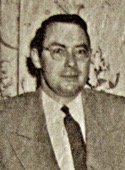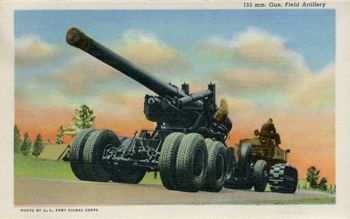Uncle Bill and World War II
Editor's Note: When you see these three dots surrounded by a gray rectangle — 1 — you can click on it to get further information about the topic. Click a second time, and the message goes away.
My Uncle Bill

My mother had two younger brothers — the closest in age to her was Bill, a handsome and intelligent young man who seemed to enjoy life and loved a practical joke, especially if he was playing it on someone else. Bill and my mother were pretty close. Born in February of 1919, he was just 19 months younger than her. Growing up, I did not live close to my uncle or his family, so I saw him only a few times in my childhood.
In my teens, however, he and I shared several letters, usually talking about my life while he was sometimes advising me. They were always friendly, open letters, but I didn’t always take his advice. Late in life, he developed Alzheimer’s, but before he forgot everything about his life, he called me one day and we talked. It was a surprise, but one that meant a lot to me.
I knew that my uncle had been in World War II. I was told that, even though he had very poor eyesight, he was determined to be in the war and fight the Nazis. Beyond that, I didn't know much.

He joined the Army but it wasn’t long before they realized that his eyesight would not allow him to be an infantryman; still, they understood that he was intelligent and capable….and eager and willing. He was classified as “limited service” and did only six weeks of 13 weeks of basic training — something he said he later regretted. He was an aide to a major and they provided support for the 981st Field Artillery Battalion, who were part of the 142nd Group, VII Corps Field Artillery. Their primary weapon was referred to as a Long Tom.
My uncle did not fire them — the Long Toms — but he and the Major were often quite nearby.
“Our guns were 155s, called Long Toms. They threw a massive shell 15 miles. Those poor cannoners. They were the heroes of the Long Toms. How they worked, mostly always stripped to the waist.”
For many years I knew virtually nothing about his experiences in World War II and then his daughter — my cousin — sent me a document he had written in 1993. Twenty-six pages, singled-spaced. He poured his heart out and told his story. Parts of it are funny (because my uncle did find humour in life) but it is also filled with disquieting and disturbing images. World War II was a life-changing event for him; he never got over it.
In talking about the Battle of Falaise Pass, he wrote this to his children and grandchildren and future descendants:
“It was very scary for us. At night the Germans kept sending up flares. That’s a chiller for you. And then between the noise of our guns we’d hear our tanks going forward. That’s a weird sound. You’re glad they’re ours, and glad you’re not going with them, but you might pay attention [when] reading about this battle [Battle of Falaise Pass]. It’s when I started getting my first gray hairs.
“After the battle, when all the Germans who could escape had escaped we spent one night in the centre of this destruction. I’ve never figured out why we went in there and spent a night there. Tanks destroyed, some upside down, trucks burned out, horses' bodies upside down with their legs in the air…a most horrible, putrid smell everywhere. Most of us slept upright in vehicles. No one wanted to sleep on the ground.
“Nearby, just off the road was an upturned horse- drawn German kitchen. I searched through the remains. I was looking for pots and pans and I found some. We used them the rest of the war. One pot for washing clothes. This relieved our using helmets for laundry pots because we weren’t keen on washing our socks in a stall helmet and then cooking potatoes in there. One pot was for making hot water for coffee. I was really glad to get out of there.”
One would hope that that was his worst experience, but there are more to tell.
Bill's Battles
The Major and Bill and other members of their group provided support for the artillery. They were rarely in the thick of battle, but more often behind the line. This does not mean they didn’t see and experience many terrible things. It just means that they weren’t first at the front line.
Bill was involved in several battles (Click on the link for each battle to read more about his experiences). (This page last edited on August 4, 2025.)
- Normandy June 6, 1944
- The Battle of Cherbourg June 18, 1944
- Battle of the Hedgerows and Battle of Saint Lo July 7-19, 1944
- Battle of the Falaise Pocket August 11-21, 1944
- Battle of the Hurtgen Forest September 19 - December 6, 1944
- The Fall of Aachen October 2-21, 1944
- Battle of the Bulge December 15, 1944 - January 25, 1945
My uncle's experiences, like all war experiences, was unique to him and to his personality. While reading about some of the terrible experiences he had, I also was very amused by his sense of humour. He was like "Radar" from MASH. Here are two other tales of his, a little lighter in flavour:
My Uncle was like "Radar" in MASH: the search for pots, pans, good food, liquor, and anything else you might need!
The Hoax: My uncle could never resist a good practical joke. Here's the one he loved talking about.
-
These three dots behave exactly like a footnote. Click on them and you will get more information about the topic. ↩︎